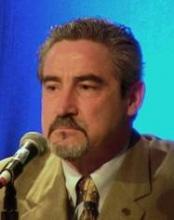MIAMI – Physicians can optimize quality of life and health for children and adolescents with cystic fibrosis by helping them overcome some considerable nutritional challenges, according to a pediatric gastroenterologist.
Following a diagnosis of cystic fibrosis (which can come as early as the newborn period, with a failure to thrive), "nutritional issues are very common. They are the cornerstone of the deficiencies," Dr. William I. Muinos said.
Parents and patients will need your help to comply with a high-fat diet, for example, or to dose the right amount of pancreatic enzyme therapy as the infant grows through childhood and beyond.
Supporting an appropriate diet is the simplest and most obvious intervention, Dr. Muinos said. However, compliance with a diet in which 35%-40% of total calories come from dietary fat can be challenging. "It sounds easy: Eat more fat! But try to get a picky toddler to comply. He may not want to eat in the hypermetabolic state."
Even with dietary supplements and calorie-dense foods, "it is very difficult, especially in growing children, to consume this amount of dietary fat," Dr. Muinos said at a pediatric update sponsored by Miami Children’s Hospital.
A hypermetabolic state adds to the difficulty. "Think of a long-distance runner trying to eat a Whopper and french fries and drink a milk shake while he’s running a 5-minute mile for 26 miles, and trying to do the work to absorb this food while he’s running. It’s very difficult to do that," he said.
Ideally, nutritional deficiencies should be addressed before they contribute to significant morbidity. Cystic fibrosis adversely affects multiple systems, including many gastrointestinal organs. The high-fat dietary requirements stem in part from deficiencies in pancreatic enzymes that break down fat in the intestine, combined with malabsorption along many portions of the GI tract.
"Manifestations in the gastrointestinal tract are what I deal with on a day-to-day basis," said Dr. Muinos, a pediatric gastroenterologist at Miami Children’s Hospital.
Pancreatic enzyme therapy, therefore, is a cornerstone of cystic fibrosis treatment. Primary care physicians can help families because it can be very difficult to calculate the amount a growing infant, child, or teenager should receive. In general, patients will need 500-4,000 lipase units per gram of fat ingested per day, Dr. Muinos said.
"Children and parents are asked to figure out how many enzymes to give, based on how much fat they are ingesting." Both weight-based and age-based dosing regimens are challenging, he added.
Another issue is that most parents do not know all the fat content in the food," Dr. Muinos said. "How many of you know how much fat was in the doughnut you ate this morning?"
Enzyme therapy also presents some practical hurdles that vary by age. "Infants might spit them up. Toddlers are toddlers and might refuse to take them. Older kids don’t want to be different; they don’t want to take the enzymes in front of their friends."
Watch for adverse events. Colonic strictures, for example, have been reported with high-dose enzyme therapy. Refer the patient to a gastroenterology specialist if adverse effects or symptoms of nutritional malabsorption persist, Dr. Muinos said.
Because of the fat metabolism and absorption challenges, clinical deficiencies in vitamins A, D, E, and K are common. "The high incidence of fat-soluble vitamin deficiencies contribute to the significant morbidity and mortality for our patients," Dr. Muinos said. For example, vitamin A deficiencies can lead to blindness; vitamin D deficiency can cause immune system dysfunction; vitamin E deficiency can cause truncal ataxia; and vitamin K deficiency can significantly affect coagulation factors.
This means the child will be taking more pills, Dr. Muinos said. In addition to the enzyme pills, they have to take fat-soluble vitamins on a daily basis.
"If things fail, we always have tubes in gastroenterology." Tube feeding can address high energy requirements, poor absorption, and/or poor intake. Tube feeding is generally indicated for children with cystic fibrosis whose height is below the 85th percentile and who demonstrates no weight gain for 2-3 months (if aged younger than 5 years) or no weight gain for 6 months or weight loss for 2-3 months (if aged 5 years or older).
"The challenges in treating these patients are incredible," Dr. Muinos said. He added that the only way to truly improve quality of life and outcomes for these patients is to find a cure.
Dr. Muinos reported that he had no relevant financial disclosures.




